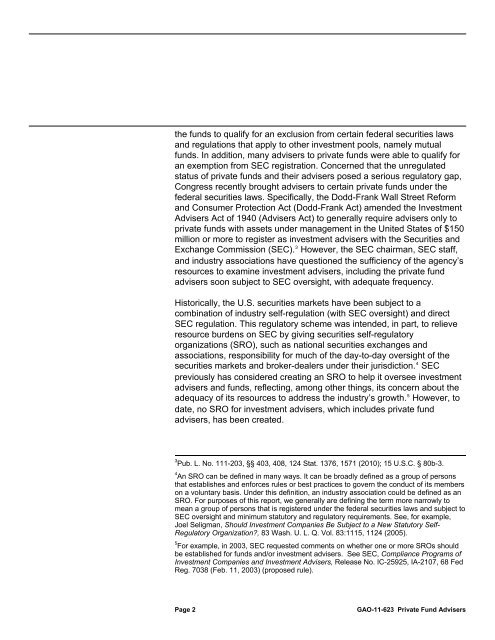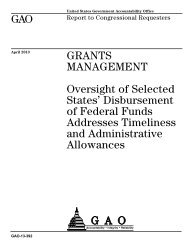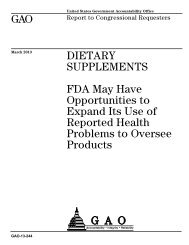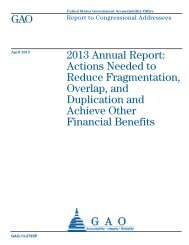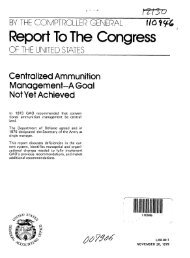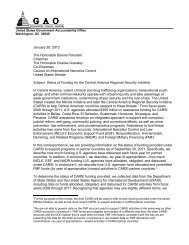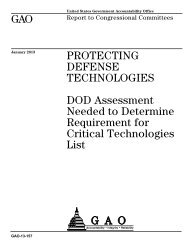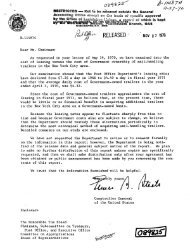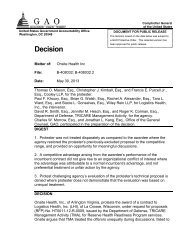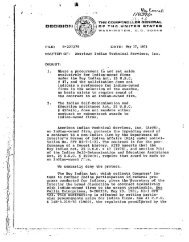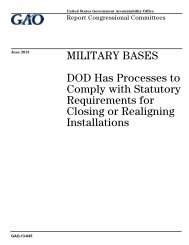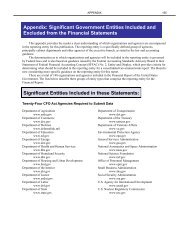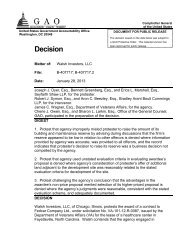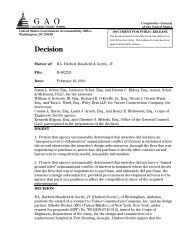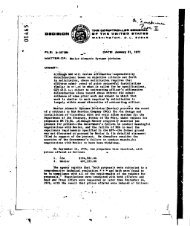GAO-11-623 Private Fund Advisers: Although a Self-Regulatory ...
GAO-11-623 Private Fund Advisers: Although a Self-Regulatory ...
GAO-11-623 Private Fund Advisers: Although a Self-Regulatory ...
Create successful ePaper yourself
Turn your PDF publications into a flip-book with our unique Google optimized e-Paper software.
the funds to qualify for an exclusion from certain federal securities laws<br />
and regulations that apply to other investment pools, namely mutual<br />
funds. In addition, many advisers to private funds were able to qualify for<br />
an exemption from SEC registration. Concerned that the unregulated<br />
status of private funds and their advisers posed a serious regulatory gap,<br />
Congress recently brought advisers to certain private funds under the<br />
federal securities laws. Specifically, the Dodd-Frank Wall Street Reform<br />
and Consumer Protection Act (Dodd-Frank Act) amended the Investment<br />
<strong>Advisers</strong> Act of 1940 (<strong>Advisers</strong> Act) to generally require advisers only to<br />
private funds with assets under management in the United States of $150<br />
million or more to register as investment advisers with the Securities and<br />
Exchange Commission (SEC). 3 However, the SEC chairman, SEC staff,<br />
and industry associations have questioned the sufficiency of the agency’s<br />
resources to examine investment advisers, including the private fund<br />
advisers soon subject to SEC oversight, with adequate frequency.<br />
Historically, the U.S. securities markets have been subject to a<br />
combination of industry self-regulation (with SEC oversight) and direct<br />
SEC regulation. This regulatory scheme was intended, in part, to relieve<br />
resource burdens on SEC by giving securities self-regulatory<br />
organizations (SRO), such as national securities exchanges and<br />
associations, responsibility for much of the day-to-day oversight of the<br />
securities markets and broker-dealers under their jurisdiction. 4 SEC<br />
previously has considered creating an SRO to help it oversee investment<br />
advisers and funds, reflecting, among other things, its concern about the<br />
adequacy of its resources to address the industry’s growth. 5 However, to<br />
date, no SRO for investment advisers, which includes private fund<br />
advisers, has been created.<br />
3<br />
Pub. L. No. <strong>11</strong>1-203, §§ 403, 408, 124 Stat. 1376, 1571 (2010); 15 U.S.C. § 80b-3.<br />
4<br />
An SRO can be defined in many ways. It can be broadly defined as a group of persons<br />
that establishes and enforces rules or best practices to govern the conduct of its members<br />
on a voluntary basis. Under this definition, an industry association could be defined as an<br />
SRO. For purposes of this report, we generally are defining the term more narrowly to<br />
mean a group of persons that is registered under the federal securities laws and subject to<br />
SEC oversight and minimum statutory and regulatory requirements. See, for example,<br />
Joel Seligman, Should Investment Companies Be Subject to a New Statutory <strong>Self</strong>-<br />
<strong>Regulatory</strong> Organization?, 83 Wash. U. L. Q. Vol. 83:<strong>11</strong>15, <strong>11</strong>24 (2005).<br />
5<br />
For example, in 2003, SEC requested comments on whether one or more SROs should<br />
be established for funds and/or investment advisers. See SEC, Compliance Programs of<br />
Investment Companies and Investment <strong>Advisers</strong>, Release No. IC-25925, IA-2107, 68 Fed<br />
Reg. 7038 (Feb. <strong>11</strong>, 2003) (proposed rule).<br />
Page 2<br />
<strong>GAO</strong>-<strong>11</strong>-<strong>623</strong> <strong>Private</strong> <strong>Fund</strong> <strong>Advisers</strong>


